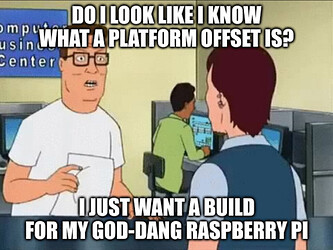A lot of this is actually in the nixpkgs manual, but I consider it really overwhelming due to too much prose and too many analogies. Let me try to summarise.
The three platforms are relevant when building a compiler:
-
buildPlatform= platform where the compiler is built -
hostPlatform= platform where the compiler is run -
targetPlatform= platform for which the compiler emits code, if the compiler has the limitation of only being able to emit code for a single platform
The word “compiler” here is relevant, because if you’re not building a compiler, then targetPlatform is a bit nonsensical here and we should really just care about the first two platforms. (s/compiler/package/g, in that case…) Moreover, if you can choose the compiler’s target at runtime, then targetPlatform becomes irrelevant.
So, I’ll discuss for now the case of a non-compiler package, where we only care about build and host, because that’s really what us mere mortals are generally dealing with.
In such a case:
-
depsBuild*: things that should only be available at build-time, i.e. never get into the runtime closure!-
depsBuildBuild: used to emit more build-time code (e.g. some executables/libs used to build build-time tooling) -
depsBuildHostnativeBuildInputs: used to emit runtime code (e.g. build-systems for your package, likecmake, go here) -
depsBuildTarget:used tojust don’t.
-
-
depsHost*: things used at runtimeIn other words,
depsHostHostanddepsHostTargetbuildInputsare the same, but we prefer calling the runtime depsbuildInputsfor no reason other than historical precedent.But for the sake of strictness in this case, I will pretend that
depsHostHostrefers tobuildInputsin the non-compiler case since, again,targetis nonsensical. -
depsTargetTarget: did you forget we don’t care about target?
To summarise: in a non-compiler package, we only use:
-
depsBuildBuild, -
depsBuildHostnativeBuildInputs, and -
depsHostHostbuildInputs.
By this logic, to answer @anon20203487’s question:
extra-cmake-modules (ECM) is a (KDE???) package which contains instructions for augmenting cmake to find various commonly-used binaries and libraries at build-time. In other words, cmake is using ECM at build-time, for build-time, i.e. you do not want ECM in the runtime closure!
So strictly speaking, cmake goes in depsBuildBuild, ECM goes in nativeBuildInputs.
If cmake is also used to build the actual package, then cmake will also go in nativeBuildInputs.
This duplication is fine, because the two uses of cmake in these lists mean two different things.
Finally, whatever libraries you’re linking against, including those mentioned by ECM, will go in buildInputs.
Technically runtime binaries could also go in buildInputs, but AFAIK we don’t have any hooks to wrap the resulting package with binaries from buildInputs (we usually just use symlinkJoin or an explicit makeWrapper call), so it’d be kind of useless to put binaries in that list.
Oh yeah and uh, let me note the irony of mentioning a KDE package, because Qt cross is broken in nixpkgs lmao
Maybe I’ll write a splicing essay tomorrow…
